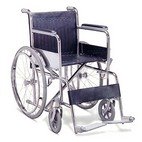If it were a horse, I'd take my old Quantum 6000 out back and shoot it. I have a love-hate relationship with the powerchairs. I'm eternally grateful that in this day and age we have such equipment, yet hate the fact that I'm reliant on such equipment.
With the mobility that these power wheelchairs provide, I shudder to think of a time not so long ago when paraplegics were condemned to wheeling about in rickety wooden framed, wicker seated, solid tire, manual chairs. The occupant of this two-wheeled weapon had to combat the environment - to do battle with sidewalk curbs with no ramped entry, doors with no automated openers, washrooms only built for the ambulatory etc. Life is better with advances in wheelchair technology as well as a society with some understanding and compassion for disabled citizens. Yet, life is not easy...
I never thought that six years post injury, I'd still be in a wheelchair. Then again, I never imagined that I would ever be in a wheelchair, period! Nobody in a chair ever does.... But here I am....
Back to the subject of this post. My old Quantum 6000 served me well. It gave me very few reasons to curse it though a few times it did die on me and for a paraplegic totally dependent on a powerchair - there is no opportune time for a breakdown to occur. A flat tire at the start of a workday, a joy-stick controller which had a mind of its own in determining when the chair should shut off (first time was in a revolving door!). Bearings in the castors that froze, drive motors which refused to drive, etc. I also contributed to this chairs demise. I had driven into obstacles and bent the leg rests into the shape of pretzels as well as having destroyed the padded arm rests by driving to close to the bus' chair lift and shredding the foam like cheese on a grater. I found parts on the ground and had no idea where on the chair they came from! Yet the chair held together and hauled my ass around for six years,...and still on the original battery!
I decided it was time for a new chair however I had no idea if the government would once again provide assistance in my acquiring a new powerchair. The Canadian province of Ontario has a program, the Assistive Devices Program (ADP) which eases the financial burden on people with disabilities by paying 3/4 of the price of assistive devices (wheelchairs, walkers, braces etc.). When I was discharged from the hospital, I was paralyzed from the chest down and so a powerchair with a tilt mechanism was imperative. The powerchair for my paralysis and the tilt to shift my weight so as to minimize the development of 'pressure sores' which can easily become infected. Now, some six years later, I can move my legs with ease, stand and even move some toes with determination. Those pressure sores never materialized. However, I still can't walk without assistance.
So, the question was whether I would once again be entitled to government assistance for a powerchair, or any wheelchair for that mater? With the current state of the economy, most government programs are being cut back. Would the qualifications be tightened as to who could expect government assistance? Would only those most disabled, the most in need, be granted assistance? I have great upper body strength. Would I only be entitled to a manual chair? (which I already have).
The situation was this. I cannot perform my duties at work with a manual chair as I have to physically move about the workplace frequently and have to carry items. I cannot carry items in a manual chair as both hands are used in propelling the chair. With the powerchair I have one had free to carry items while I control the chair with the other hand on the joystick. I need to stand to reach items on shelves. With my manual chair, I cannot stand up as the brakes are not strong enough to hold my weight when I brace against the seat. I would push the chair backwards and fall backwards into it. Only another powerchair would do.
Now, a new powerchair costs between $10,000 and $18,000 depending on type (tilt, etc.) and accessories. I simply cannot afford to pay that on my salary, every 5-6 years. By the time I would pay down the chair, it would be time to buy a new one! So the alternatives seemed to be:
- The government, through their ADP program would once again assist me by paying 3/4 of the cost of the new powerchair which would then allow me to continue to work, be self sufficient and pay taxes to that very same government.
- The government would decline my ADP request for assistance, leaving me unable to do my job and forcing me to quit. No longer self sufficient, I would have to apply for government disability and no longer would be paying income tax to the government.
Through an acquaintance, obtained the name of an ADP representative who would evaluate my needs and submit the funding application to the government on my behalf. I was delighted to find the ADP representative to be most professional, friendly and receptive to my dilemma. Over two meetings she determined the best seating for my needs and put me in touch with the a sales representative colleague who then suggested various wheelchair makes and models which would best suit my needs.
Still, it took about a half year before everything came together. My only major request was that the chair would have a 'retractable' foot rest which would fold upright, stowed out of the way, somewhere under the seat. This would replace the two separate foot supports that hung from the front corners of the chair - the ones I always managed to bend.
What I ended up choosing was the Permobil M300 motorized wheelchair. My 6 year old Quantum 6000 and the new Permobil M300 are pictured below.
Click on Photo to enlarge for better viewing
Click on Photo to enlarge for better viewing
Some problems which had to be overcome while others I simply have to get used to;
- The large 8" radius front castors on the Permobil are great for climbing obstacles, however when the chair stops after a turn, at least one wheel points (extends) towards the center of the wheelchair and is partially in my way if I want to stand up.
- The top edge of the foot rest plate cuts into the back of my legs when I stand and put pressure against it. To minimize this, the seat plate was moved as far forward as possible so that the plate is almost under the seat. I obtained a rather large, ~2" diameter hose from a local hardware store and sliced one side lengthwise. I slid this hose over the front edge of the seat pan to further extend it outwards by about a quarter of an inch and it acts as a cushion as well.
- The old Quantum 6000 had square arm rest frames made from tubular material (round tubes assembled into a square frame). Pouches or bags could be hung from the horizontal arms of the tubular arm rest frame in which I could keep personal items such as keys or a cell phone, etc. The vertical tubular armrest supports could be removed and a ring or clip could be added before replacing the frame. The rings could be used to secure a wallet which then could be placed into a pouch hanging from the frame. (ie. a removable pouch within another pouch). The Permobil has a curved armrest frame from which a single rectangular post extends to hold the armrest. Both the curbed frame and single rectangular post don't offer an easy way to hand personal bags or pouches. The Permobil website does offer an aftermarket side pouch but the small bag has a price of about $200, far to much for a small bag to hold a wallet. My only option is to remove an armrest cushion and sling a small "saddle bag" like pouch over the bar, then screwing the armrest cushion back onto the frame. I've yet to do this so I don't know how feasible it will be.
- As I mentioned earlier, the controller has extra "dummy" button switches on it for the non-existent European lighting package. These buttons turn on and flash but do nothing. The may be a entry point for dirt and water thereby shortening the life of the controller. My main dislike of this controller is that it goes through a self check each time the chair is turned on and that takes about 3 seconds before the chair is moveable. Now that may not sound like much but just imagine if an able bodied person would have to wait 3 seconds each time - between the time they decided to get up off their chair and start walking. It would be a major irritant!. My old Quantum fired up and would move in less than one second. An important feature if you find yourself having to escape danger quickly! So my only option is to leave it on all the time which may present a safety hazard if I hit the joystick inadvertently.
I'll let you know how things go after I've had more time to live with this chair. Getting used to a new chair after you've lived in one for six years is so much more different than just getting used to a new pair of shoes!







.jpg)



2 comments:
Although not required as regularly as some of the other checks, you will need to check electrical connections from time to time to make sure they are firmly in place, and are free of grime and corrosion. For instance, you might want to check to make sure all connections are tight after someone else has worked on your chair.
Tanisha Hertzler
I do recall when wheelchairs were first invented. The one you've just shared here is so impressive! I love the features, and the mechanics are awesome!
Post a Comment